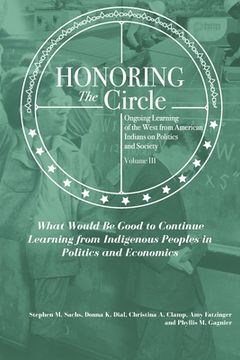Honoring the Circle: Ongoing Learning from American Indians on Politics and Society, Volume III: What Would Be Good to Continue Learning fr (en Inglés)
Reseña del libro "Honoring the Circle: Ongoing Learning from American Indians on Politics and Society, Volume III: What Would Be Good to Continue Learning fr (en Inglés)"
Honoring the Circle: Ongoing Learning from American Indians on Politics and Society, Volume III: What Would Be Good to Continue Learning from Indigenous Peoples in Politics and Economics opens showing how the main strands of American culture, including science, have been moving toward Indigenous ways of seeing. Moreover, current societal problems, such as dealing with diversity, inequality and an environmental crisis have paralleled those handled well by traditional Native societies, making Indigenous values relevant in confronting contemporary issues.Indigenous values stem from seeing all beings and all things unique, and related as a family. All contain spirit and must be respected. Diversity is a strength, as each unique limited person has a different perspective and abilities to contribute to all. Everyone needs to be heard in making decisions, and supported in an inclusive, equalitarian, participatory process with leaders as facilitators. Leaders, chosen for their virtue, including wisdom, can give guidance. As everything is related, all relationships need to be in balance among people and with nature. As relations regularly fall out of balance, it is continually necessary to restore harmony, including in issues of justice. Power and wealth need to be kept reasonably equal. Values need to be applied according to current conditions, which vary with location, with a view for the future.Applying these values in the twenty-first century means creating and maintaining equalitarian, inclusive participatory democracy, as shown in numerous practical examples. That requires fair and reasonably timed voting with equal easy access for at least legislative and executive offices, and on some issues, with open and sufficiently and equally available dialogue among citizens and between citizens and private and public institutions. Election campaigns need to be publicly financed. In today's society, many methods of open communication and discussion are available. These include electronic and face-to-face town halls and dialogues, including requiring officials to consult with citizens on major issues. Citizen participation can take place directly on some issues, as in participatory budgeting. Representative focus groups, dialoguing study groups, and conversations with officials can increase public input.Today, a well operating civil society representing all interests on a relatively equal basis is necessary. Virtually all groups--including public, private, and nonprofit organizations--need to function participatorily. Many team process businesses, NGOs and government agencies do this, as it leads to better functioning organizations by virtually all measures.Power needs to be institutionally and economically balanced, with a market economy of small businesses achieving economy of scale of buying, selling and research through federations, as in the Mondragon Cooperatives, with public utilities where market competition is inadequate. Government's role is to keep the economy balanced, preventing oligopoly or monopoly through regulation, taxes and subsidies. Government needs to regulate to prevent or minimize harm to the public, and to provide public goods as necessary for the public welfare and to create and maintain equal opportunity (e.g. education for participation in participatory society and adequate accessible health care). Inequalities can be eliminated through targeted benefits, taxes and regulation.Electronic and other media need to be independent public media and/or widely owned, with equal-time rules so that a wide range of views can be expressed in a proportionally equitable manner, with regulation as necessary to prevent clear harm, such as fraud, by independent bodies allowing quick appeals (e.g. fact checking on social media). Justice needs to be restorative, as public policy aims to facilitate the development of whole people in a caring community.

